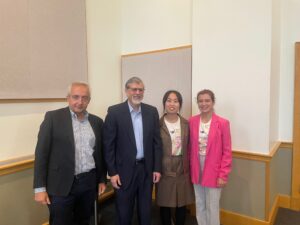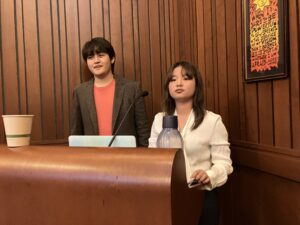
By Dennis Krolevich ’26
2023’s International Roundtable, probing the question of “Humanoids? Exploring the future of human freedom, ethics, knowledge, and relationships,” invited cutting-edge thinkers and speakers to engage in conversation around the intersections of technology, developing futures, and humanity, including sessions organized by students. We talked to two student pairs about their experiences preparing their sessions.

Agro-botics and Resistance: The Question of Human Sovereignty in Global Agricultural Production
Led by: Minori Kishi ʼ25 (German studies, environmental studies, and food, agriculture, and society) and Mathilda Barr ʼ25 (economics and food, agriculture, and society)
What was your session about?
Kishi: Our session was primarily focused on exploring the influence and impact of artificial intelligence (AI) and automated agricultural technology on global food production systems. It’s essential to examine because it presents both opportunities and challenges: there’s the potential to increase efficiency, optimize farming practices, and address food shortages; but it also raises questions about the ethical use of this technology, the possible displacement of traditional farming methods, and the socioeconomic impact on farming communities.
What did the preparation for your session look like?
Barr: Minori and I communicated regularly with our panelists and faculty advisor Bill Moseley, and we created a detailed schedule so the event would flow smoothly. The most challenging part was dividing the hour of the panel effectively, and creating the facilitated questions.
What was the main takeaway you wanted to communicate?
Barr: We hope that our audience left with an understanding of technology’s role in our system of global agricultural production, and challenged themselves to rethink what sustainable and innovative futures for feeding our planet might look like.
What did you learn from the experience?
Kishi: The hands-on nature bridged the gap between theoretical knowledge gained in the classroom and its practical application, allowing me to see how these concepts manifest in the real world. Engaging with experts, stakeholders, professionals, and peers from diverse backgrounds, including those in the ag-tech field, helped me gain different perspectives and understand those real-world applications of AI in the field.
Barr: One of the most important aspects of a liberal arts education is the ability to communicate and collaborate across disciplines. The most rewarding part of the International Roundtable was facilitating a conversation about a subject I was passionate about while adapting to the perspective of a completely unfamiliar academic field.

China’s Developmental Paradox
Led by: Jerry Park Piao ʼ25 (international studies), and Winnie Ren ʼ26 (anthropology)
What was your session about?
Piao: Our session delved into the relationship between humanity and development in China, exemplified by the implementation of the Hukou (residency) system. We examined the historical thoughts and state ideology on humanity in China, and demonstrated how rural populations are racialized and dehumanized under contemporary socio-political fabrics. To contextualize that rural experience and those consequences, we showcased examples of artistic and literary expressions.
What was the main takeaway you wanted to communicate?
Piao: That humanity is not only a self-defined identity or a moral prescription, but is frequently used as a caesura to dehumanize one group over the other.
Ren: We want the audience to understand China’s development using Marxist theory, but also have empathy towards real people.
What did you learn from the experience?
Piao: It provided me with a solid foundation of understanding critical theory and applying it in a real-world setting.
Ren: I learned useful research skills during the preparation for the session, and through that research, I gained a different perspective of seeing my country and culture.
December 20 2023
Back to top




